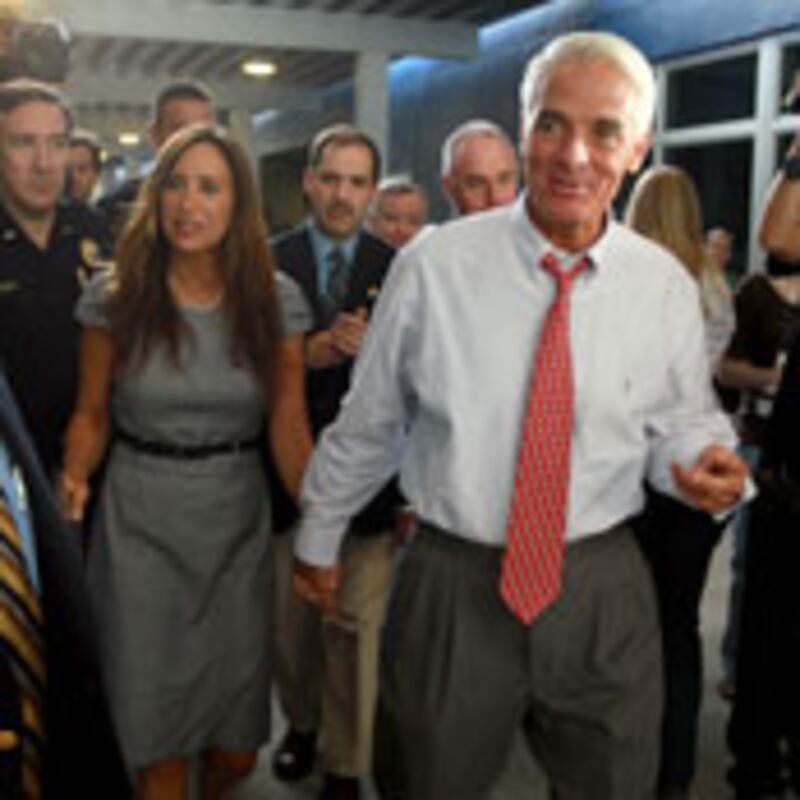
Charlie Crist might not be the sharpest tack in the box, but he's not naive. Having released a statement just weeks ago that "He will not run as an Independent or No Party Affiliation," and accusing the campaign of his GOP rival, Marco Rubio, of "unfounded rumors" that he'd do exactly that, Crist is poised to prove the rumors were entirely true. After insisting that that he was a diehard Republican conservative who'd never abandon his party, after explicitly stating that he would support the winner of the Republican nomination for U.S. Senate even if he lost, Crist is now set to embark on a quixotic crusade to rescue a decades-long political career distinguished first and foremost for its vacuousness and stupidity.
Some even suggested that Crist should join the Democrats. This is, in my view, a baseless smear against Democrats.
Crist isn't going to run as an independent on a whim. He's doing it because he knows he can win. According to a Quinnipiac survey conducted earlier this month, Crist wins by 32-30-24 against conservative darling Rubio and Democratic Rep. Kendrick Meek respectively. Granted, he loses in surveys conducted by Research 2000 and Rasmussen Reports, but Crist is nothing if not an optimist.
• Samuel P. Jacobs: Advice for Crist on Going Independent • Benjamin Sarlin: The Charlie Crist Blame GameIndeed, he's already laid the groundwork for an independent campaign. Rather than run as the real conservative in the race, the role he tried to play during his primary fight against Rubio, he is standing as the defender of Florida's public sector unions, a powerful army of foot-soldiers that could put him over the top in a tight three-way race. On April 15th, Crist vetoed Senate Bill 6, a top priority for Florida Republicans, that eliminated tenure for new teachers and that linked future pay increases to student achievement.
As Rick Hess, one of the country's smartest education analysts, noted at the time, the legislation was far from perfect. Yet in light of the economic crisis facing Florida, a state ravaged by a 12.2 percent unemployment rate and a mounting public debt disaster that Crist has done much to exacerbate and precious little to solve, it was a necessary first step towards right-sizing state spending over the long term. Incredibly, Crist was until recently one of the staunchest advocates of the proposal, thus making his insistence at the time that his veto had nothing to do with the Senate race ring false. One has to assume that Crist sincerely believes that Florida voters are imbeciles.
Many observers see Charlie Crist as a patron saint of Republican moderation, a sensible pragmatist who has been driven out of his party by frenzied Tea Partiers on a jihad against common sense. Some even suggested that Crist should join the Democrats. This is, in my view, a baseless smear against Democrats, who deserve better than to be associated with the likes of Charlie Crist. Consider Crist's reaction to President Obama's health reform effort. Instead of defending the effort as a sensible measure that would improve the deficit while delivering a massive coverage expansion, he seemed to argue that he liked every part of it except for the fact that it would, in his words, "raise taxes significantly, it would raise rates significantly and it would take half a trillion dollars out of Medicare." We can debate the merits of the Affordable Care Act backwards and forwards, but surely Crist understands that paying for a coverage expansion requires either raising taxes, finding savings in the Medicare program, and probably both. But rather than make the case for, say, a less expensive approach to coverage expansion that would require less in the way of revenues or spending cuts, he wished away the problem, as he so often does.
Crist took a similar approach to President Obama's federal stimulus legislation. Like many sitting governors, Democrats and Republicans, Crist welcomed the massive injection of aid to state governments that, in the absence of the stimulus, would have been forced to make heavy pro-cyclical spending cuts. But of course most state governors understood that the stimulus was in all likelihood an emergency measure, not a permanent source of funds for state governments. Once the economic crisis passed, the ballooning state budgets that were at the heart of the problem—state spending expanded at a rate of six percent a year across the United States—would have to be pared back. Except, that is, in Fantasyland, where Crist has long since taken up permanent residence. Crist explained to reporters Marc Caputo and Steve Bousquet of the Miami Herald that the stimulus meant that Florida's state government wouldn't have to raise taxes, and indeed that it could cut taxes. He also promised more spending increases: "We have more money for education, so we can increase per-student spending. We can spend more money on our roads and infrastructure. We can provide health care for our people. I mean, it's remarkable." With Florida's economy in a tailspin, and with the country in a deep fiscal hole, where would the money come from? Crist was never a details man.
The fundamental problem is that the fiscal crisis facing Florida is a microcosm of the fiscal crisis facing the country. One reason Florida's population boomed over the last decade is that the state, as Nicole Gelinas explained in City Journal last year, created a state-guaranteed property insurance program that heavily subsidized a building boom in extremely vulnerable regions in the state, a program that all but guaranteed massive losses during the hurricanes that batter Florida almost every year. It's a scheme almost Madoff-like in its elegant fraudulence. And who will wind up paying for this unsustainable commitment? It won't just be taxpayers in Florida but rather taxpayers in the many states that have been losing residents to Florida over the last several decades.
Charlie Crist's opponents aren't paragons of virtue. Both Meek and Rubio have made missteps of their own. But both men are vastly superior to Crist. Meek is, to his credit, a consistent liberal who is willing to support tax increases to fund new spending commitments, which is more than can be said of Crist. Rubio has taken the remarkable step of arguing that Social Security spending needs to be trimmed, a gutsy move for a candidate of any party in Florida. Only one candidate is awe-inspiring in his mendacity, and that is Charlie Crist. But for the love of all that is decent, let's free Charlie Crist from the crushing burden of public service and free him to become a corporate pitchman, alligator-wrestler, or country lawyer—anything but U.S. senator.
Reihan Salam is a policy adviser at e21 and a fellow at the New America Foundation.






